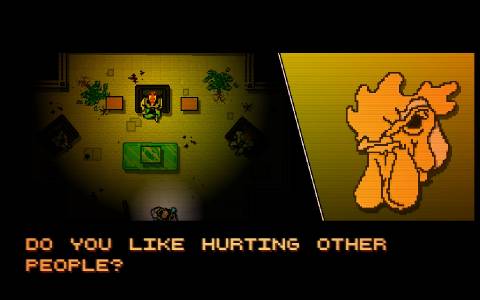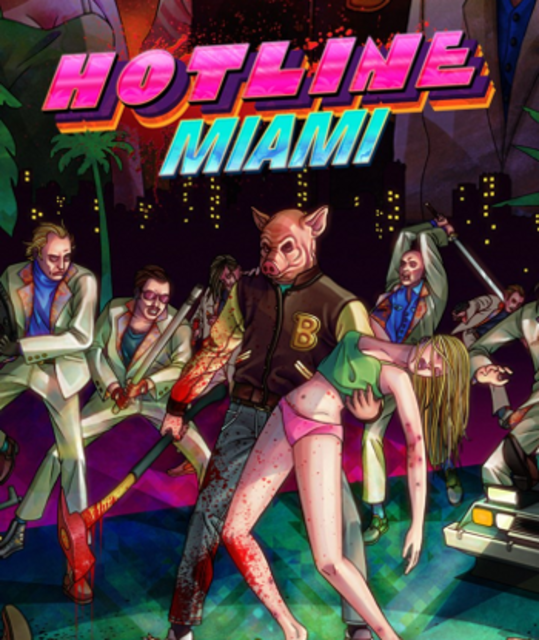Hey you! There are some spoilers near the end of this bit. You've been warned.
Murder simulator. Power fantasy. Violence porn. Hotline Miami is all of these things, but unlike nearly every other violent shooter in the medium, it’s perfectly aware of this. In fact, it’s rubbing your nose in it. It’s an extremely confrontational discussion of violence in videogames that happens to be wrapped up in a mechanically brilliant game. At the core of Hotline Miami’s impact is its central question, posed to the player in an early cutscene: “Do you like hurting other people?” It’s enough to make you think very, very carefully about what you’re doing when you play Hotline Miami, or any of the extremely popular and commercially successful modern military shooters that occupy the market.

Hotline Miami is a top-down shooter, where death comes extremely easily for both the player and the characters in the game. Your objective is to move through each floor of a building and kill every single occupant in the fastest, most efficient manner possible. The combat is extremely fast, and one hit from an enemy will bring your game to an end. It’s extremely easy to die, and you will often start a level dozens of times over until you manage to complete it. Restarting is instantaneous, however, so there’s no delay in getting back into the action. In this way, HLM is quite similar to Super Meatboy or Trials. You’re presented with increasingly difficult objectives that have zero margin for error, but you are not penalized for restarting. Eventually you’ll find the best “line” through a level and complete it, and the mental reward for doing so is considerable. Hotline Miami just feels really, really good to play - working from the razor focus of each individual level to the huge endorphin rush of completing them is exhilarating. There's just enough random behavior from the AI to add an element of panicky improvisation to the gameplay as well.
You kill enemies quickly in HLM, with many different tools. You start killing with your bare hands, strangling your enemies or knocking them over and smashing their heads into the ground until they split open. Enemies will drop baseball bats, crowbars, and knives, which can be wielded or thrown. You might burst into a room, knocking over the enemy standing behind the door and rushing the other one with your knife before he has a chance to shoot you with his gun. Then, you go back to the enemy you knocked over and slit his throat with your knife. Then, you can pick up one of their guns and shoot another enemy in a hallway. The loud gunshot attracts attention, and all of the enemies within earshot will then rush towards the sound. You can then hide behind a corner and kill them all as they walk into your line of fire. One mistake in this entire sequence, one botched shot or delayed reaction and you’ll be killed instead, instantly starting over to try it again.
The 16-bit graphical style is overlaid with filters that look like you’re watching through a busted VCR with poor tracking, and the entire screen lists to the right and left as you move around. The backgrounds outside of the playable levels transition between solid neon colors and flash red when you kill an enemy. The effect can be disconcerting, and would be much more so if the mechanics of the game didn’t require so much of your attention. The soundtrack is full of excellent chiptune songs that fit perfectly with the Drive-as-a-videogame aesthetic. The enemies are seen top-down at first as only heads, shoulders and weapons, all end up sprawled on the floor after you kill them, in pools of blood, occasionally missing limbs or heads (depending on how they died). The game looks exactly like what worried mothers and Jack Thompson imagined we were playing back in the Doom era. At the end of every level, the moment you kill the last enemy the music cuts abruptly, replaced with a sort of atonal humming. Every single time, my stomach lurched and I got a giddy, nervous feeling. I realized that my hands had gone clammy and my heartbeat felt a little too fast. Of course, the level doesn’t just end there. You have to walk back to the beginning of the level, which means you have to tour the rooms filled with bodies. This is the biggest “innovation” in Hotline Miami. Not only do you see what you’re doing while you’re doing it, but you’re forced to go back and look at what you did after you did it.
Look at any big-budget action title where the main activity is killing enemy characters. Any of the Call of Duty, Medal of Honor, or Battlefield titles first spring to mind. In those games, you’re always given some sort of heroic goal or shadowy organization to topple as an excuse for ending the virtual lives of hundreds, sometimes thousands of virtual humans (sometimes even virtual civilians!). Some games even include torture sequences. Notably, Call of Duty: Black Ops features a scene where you take a piece of glass from a broken window frame, place it in the mouth of another character, and then punch him in the face (presumably so he’ll bite down on the glass and cut his mouth to shreds). The cutscene is “interactive,” in that you press the button to punch the character. At an E3 demo for Splinter Cell: Blacklist, a player is given the moral choice to kill someone, absurdly after they’ve already played an interactive torture sequence where they spin the control stick around to twist a knife in someone’s clavicle. Tom Bissel, after playing the demo, “spent a couple days feeling ashamed of being a gamer, of playing or liking military games, of being interested in any of this disgusting bullshit at all” (1).
During the final sequence of Hotline Miami, the second player character encounters the figures who have been leaving cryptic voice mails and orchestrating the action of the game. It’s vague and disappointing until you realize that the conversation is between you, the player, and Jonatan Söderström and Dennis Wedin, the developers. “Why all the killing? You think this is a game?” you ask, indignant. “Well of course it is. Didn’t you enjoy it?” Any sort of window dressing about the Russian mafia or a shadowy conspiracy is besides the point. Hotline Miami is a game about player mentality. You can leave the final level without killing the last two enemies, and in one mission you can go through an entire building full of people without killing a single one, but most of us will kill them all anyways. It’s because we enjoy hurting other people.

Log in to comment